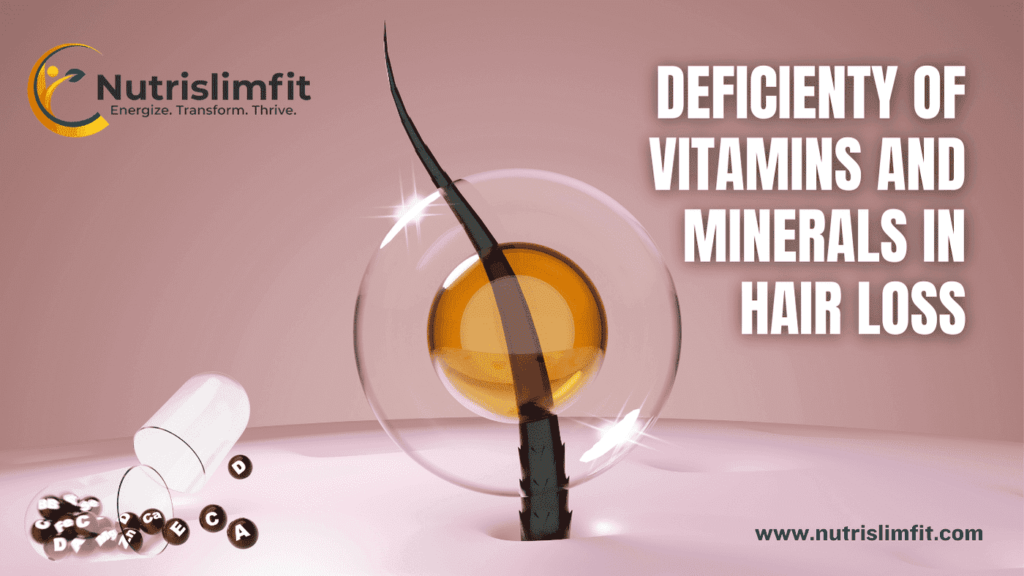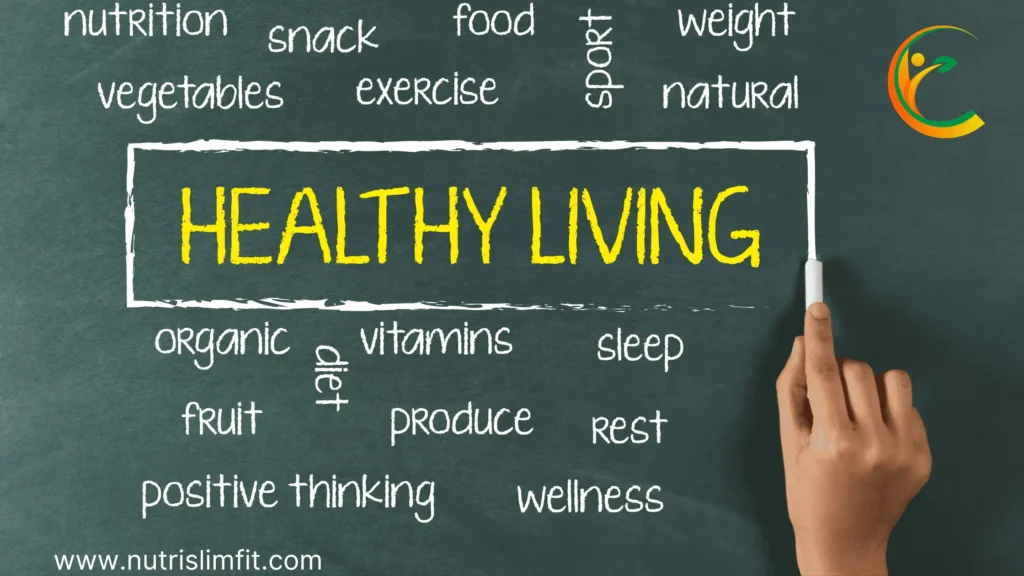Hair loss is a common problem that can have many causes. One potential cause is a deficiency in certain vitamins and minerals that are essential for healthy hair growth. In this in-depth blog post, we will explore the Deficiency of Vitamins and Minerals in Hair Loss

An Overview of Hair Loss
Before diving into specific nutrient deficiencies, let’s review some basics about hair and hair loss.
Hair grows from follicles underneath the skin. Each strand goes through phases of growth (anagen phase), transition (catagen phase), and rest (telogen phase) throughout its life cycle. It’s normal to lose some hair each day as strands reach the end of this cycle.
Hair loss refers to excessive hair falling out or thinning. It becomes a concern when you lose more than 100 hairs per day. The most common types of hair loss include:
- Androgenetic alopecia: This genetic hair loss is also called male or female pattern baldness. It relates to the hair growth phases getting progressively shorter over time.
- Telogen effluvium: This refers to an increased number of hairs in the “resting” phase, which causes more hair to fall out. It may relate to stress, illness, childbirth, or nutrient deficiencies.
- Alopecia areata: This autoimmune disorder causes patchy hair loss, often starting with circular bald patches on the scalp.
Other causes for hair loss include medications, infections, medical conditions like thyroid disorders, autoimmune disease, and trichotillomania (hair-pulling disorder).
Now let’s take a closer look at how nutrient deficiencies can impact the hair growth cycle and cause excess shedding or thinning locks.
Vitamin Deficiencies Related to Hair Loss
Several vitamins play important roles in the hair follicle growth phases. Lacking of these vitamins can contribute to hair loss symptoms:
Vitamin D
Vitamin D helps regulate cell growth and renewal. Studies show many individuals with hair loss have low vitamin D levels.
Severe vitamin D deficiency affects hair cycle phases:
- Pushes more hairs into the “resting” phase
- Shortens the growing phase
- Lengthens the shedding phase
Low vitamin D relates to alopecia areata and female pattern hair loss in research studies. Supplementing has helped some people grow thicker, healthier hair.
Key Takeaway: Vitamin D deficiency can contribute to hair loss issues. Check your levels and supplement if low. Consider adding vitamin D-rich foods like salmon, tuna, eggs, and fortified dairy and cereals. Spend 10-30 minutes in midday sunlight per day for natural vitamin D as well.
Vitamin E
Vitamin E contains antioxidants that combat oxidative stress and inflammation. Since hair follicles are vulnerable to damage from oxidative stress, vitamin E plays a protective role.
A study in lab rats found dietary vitamin E deficiency contributed to:
- Increased oxidative stress markers
- Decreased hair follicle growth
- More hairs in the “resting” and shedding phases
Meanwhile, animals fed foods rich in vitamin E had improvements in hair regeneration. Human studies on vitamin E-related hair growth are still limited.
However, people with hair loss tend to have lower blood levels of vitamin E compared to those with healthy hair. Vitamin E may help regulate hormones involved in hair cycling phases too.
Key Takeaway: Many people are low in antioxidant vitamins like E. Boost intake to support hair health. Include vitamin E-rich sources like almonds, peanuts, sunflower seeds, spinach, avocados, shrimp, trout, olive, and sunflower oils. You can also try supplements, per your healthcare provider’s guidelines.
Vitamin A
Vitamin A helps make sebum, the oily substance secreted by hair glands in the scalp skin. Sebum moisturizes both the scalp and hair strands, keeping hair supple and preventing dryness and breakage.
Those with alopecia often have low vitamin A status. Some early evidence shows vitamin A supplements may help hair regrow in people with alopecia areata. Researchers hypothesize correcting the deficiency reduces inflammation involved in the disease.
Key Takeaway: Make sure to consume vitamin A whole food sources like carrots, squash, broccoli greens, salmon, eggs, and full-fat dairy. Pair with healthy fats to boost absorption of this fat-soluble nutrient. A vitamin A supplement may provide further benefits for those with alopecia under medical supervision.
B Vitamins: Biotin, Niacin, B5, B6, B12
The B-complex family serves various roles in hair health:
- Biotin: Helps form the hair protein keratin. Deficiency relates to brittle hair prone to breakage.
- Niacin: Promotes microcirculation around follicles.
- Pantothenic acid (B5): Participants of a study saw reduced hair shedding and increased shine after taking B5 supplements.
- Pyridoxine (B6): Associated with preventing graying and hair thinning.
- Cobalamin (B12): Necessary for healthy red blood cells to carry oxygen and nutrients to hair follicles. Low B12 levels relate to hair loss.
Many shampoos and hair health supplements contain biotin and other B-complex vitamins. Studies show promising results, including one report of increased hair growth and thickness in women taking a supplement with B vitamins, vitamin C, vitamin E, and mineral zinc.
Key Takeaway: Make sure to get adequate B vitamins from whole foods like eggs, chicken, fish, leafy greens, dairy products, legumes, seeds, avocados, and bananas. Try adding a B-complex supplement if blood work shows any deficiencies.
Vitamin C
Vitamin C is a powerful antioxidant that fights inflammation and oxidative damage. The free radicals it neutralizes can otherwise inhibit hair growth and trigger thinning. This vitamin also plays a role in iron absorption.
Low vitamin C intake relates to higher rates of hair loss in men according to research. Another study proposes women with hair loss have vitamin C deficiency too. Loading up on vitamin C-rich foods proved helpful for hair regrowth in a case study.
Key Takeaway: Make sure to get your daily dose of vitamin C. Sweet and hot peppers, dark leafy greens, broccoli, berries, citrus fruits and kiwi offer this nutrient. Consider supplementing in divided doses around 500-1000 mg daily, if directed by your healthcare practitioner.
Mineral Deficiencies Related to Hair Loss
Minerals serve various structural and regulatory roles that impact hair follicle cycling. The key minerals involved include:
Iron
Iron enables red blood cells to carry oxygen throughout the body to nourish hair follicles. Low levels cause anemia and oxygen shortage. This appears to impact hormones regulating hair cells.
Multiple studies associate low iron stores with hair loss, particularly in women with heavy menstrual periods. Research shows iron supplementation improves hair thickness and regrowth in women with iron deficiency.
Key Takeaway: Boost iron intake with red meats, eggs, legumes, spinach, and iron-fortified whole grains. Vitamin C from citrus, peppers, berries, and supplements aids iron absorption. Talk to your doctor about testing ferritin blood levels to reveal iron reserves. Addressing low ferritin can alleviate hair shedding.
Zinc
Zinc is needed for cell growth and follicle maintenance. It also keeps hair follicle genetics functioning properly. The hormone receptors in hair follicles require zinc too.
Research finds people experiencing hair thinning often have low zinc levels. One study saw zinc supplementation reverse hair loss, encourage regrowth, and normalize zinc in the blood of affected young men.
Key Takeaway: Focus on getting enough zinc from oysters, nuts, seeds, legumes, meat, eggs, and dairy products. A supplement provides an additional zinc source if directed by your healthcare provider.
Copper
Like zinc, copper contributes to hair growth processes that take place at the cellular level. Low copper appears connected to hair loss according to some emerging research.
In one small study, male patients with hair loss had lower copper levels. After copper supplementation for 12 weeks, they experienced significantly increased hair numbers.
Key Takeaway: Nuts, seeds, shellfish, mushrooms, and organ meats provide dietary copper. Check with your doctor about copper blood testing if you suffer from thinning hair and fatigue consistent with deficiency. Short-term copper supplementation may benefit hair regrowth under medical guidance.
Selenium
Selenium is an antioxidant mineral also involved in proper hair cycling. Deficiency relates to poor hair growth, premature aging, and loss of hair color.
Little research in humans looked specifically at hair loss and selenium levels yet. However, researchers observe many people with thinning hair strands happen to be low in selenium.
Supplementing is controversial due to the narrow window between safe and excessive. Focus instead on selenium-rich whole foods like Brazil nuts, tuna, eggs, organ meats, mushrooms, and seeds.
Other Nutrients That May Contribute
While clear deficiency links exist for the above vitamins and minerals, a few more nutrients hold promise for fighting hair loss:
Protein
Hair is primarily made of a protein called keratin. Some research observes low protein intake seems to correlate with excessive hair shedding.
Consuming adequate protein provides the body with amino acids to produce keratin and regenerate hair. Getting plenty supports healthy hair density and growth.
Key Takeaway: Make sure to eat high-quality protein sources like fatty fish, grass-fed meats, pastured eggs, Greek yogurt, nuts, seeds, beans, and lentils. Time protein intake around activity for optimal utilization.
Omega-3 Fatty Acids
Omega-3s make cell membranes more elastic. This allows nutrients to better reach hair follicle cells and supports hydration. These healthy fats also lower inflammation.
Emerging research links omega deficiency with hair loss. One study found women with hair loss had significantly lower omega-3 levels. Another small trial saw increased hair density from omega-3 supplementation over 6 months.
Key Takeaway: Eat omega-3 foods like fatty fish, walnuts, flax, and chia seeds. Consider a fish or algal oil supplement to get thicker, shinier strands if omega intake remains low.
Vitamin B8 (Inositol)
B8 or inositol aids various cell processes critical for growth and survival. Called “nature’s B vitamin,” it exists in the heart and liver.
Preliminary evidence suggests inositol deficiency may contribute to hair loss. Supplementing showed benefits for hair regrowth and quality in a small number of studies.
Key Takeaway: Fruits, beans, grains, and nuts contain some inositol. An additional supplement under medical guidance may boost hair improvements.
Amino Acids
Amino acids like cysteine, lysine, arginine, and methionine promote the production and overall health of hair protein structures.
While direct evidence doesn’t confirm supplements for hair loss yet, amino acids likely support the strong, supple hair strands less prone to damage and shedding.
Key Takeaway: Egg whites, meat, dairy, soy, spirulina, and natto provide various amino acids. Consider adding collagen supplements as well.
Addressing Deficiencies to Stop Hair Loss
Identifying key nutrient deficiencies and promptly treating them may help halt hair shedding before it progresses to advanced thinning. Experts recommend getting the following tests at least annually, especially if experiencing increased hair loss:
- Full iron panel including ferritin
- Vitamin D
- Thyroid hormones
- Zinc
- Vitamin B12
Correct any deficiencies under a doctor’s supervision. In some cases, further testing proves beneficial to reveal levels of vitamin E, vitamin A, selenium, copper, and other nutrients involved in hair health.
Alongside treating deficiencies through diet, sun exposure, and possibly supplements, managing other factors like stress, hormone/thyroid problems and inflammatory illness can alleviate excess hair shedding too.
Consider updating your hair care routine as well: Treat strands gently, prioritize scalp health, and massage to stimulate blood flow. Avoid very tight hairstyles that stress hair follicles.
With a commitment to optimal inner and outer nutrition plus scalp care, nutrients can help put a stop to hair loss.
The Takeaway: What Role Do Deficiencies Play in Thinning Hair?
Hair loss relates closely to diet and nutrient status, along with health conditions, hormones, and genetics. Deficiencies in key vitamins like A, B, D, and E and minerals iron, zinc, selenium, and copper all can trigger excess shedding, thinning, and impacted hair growth cycling.
Testing nutrient status and correcting shortcomings – while also managing health conditions – provides the best shot at restoring stronger, thicker hair growth. Diet and lifestyle tweaks to obtain sufficient vitamins, minerals, protein, and healthy fats prevent further loss. Alongside good scalp care and restorative hair products, the potential emerges for noticeable improvements in hair volume and quality.


